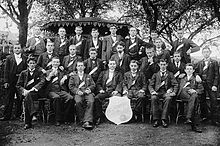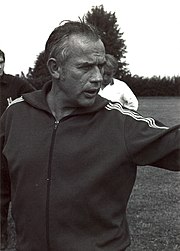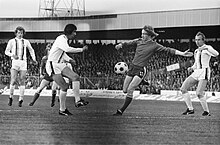Borussia Mönchengladbach
The team joined the Bundesliga in 1965 and saw the majority of its success in the 1970s, where, under the guidance of Hennes Weisweiler and then Udo Lattek, a young squad with a fast, aggressive playing style was formed.On 17 November 1899, thirteen of these young men formed a new club, this time specifically focused on association football, in the Zum Jägerhof pub.Other notable football clubs in western Germany that chose the name "Prussia" as their title include Borussia Dortmund in 1909 and SC Preußen Münster in 1906.Whereas FC Mönchengladbach was socially and financially established, young Borussia found it difficult to guarantee regular access to training grounds and equipment.As early as 1902, Borussia crossed international borders for the first time, losing 0–2 against Helmondia Helmond in the Netherlands, before playing the Dutch team to a 1–1 draw at home.[12] Ultimately, Borussia acquired a patch of land on Reyerhütterstraße in Mönchengladbach to enable organized play, at a time when the growing spread of football made it more and more of a hassle[tone] in terms of property damage and noise pollution.[13] In 1907, Borussia left Reyerhütterstraße, where a new factory was under construction, and reached a deal with Gladbacher Turnverein 1848 to cooperatively run a ground near the Schweizerhaus, a famous gastronomy in the vicinity of the Kaiser-Friedrich-Halle [de].Gladbach started into the higher league with significant issues,[vague] bringing Rheydt SpV only to a 2–2 at home before struggling with a crushing[tone] defeat in the 0–9 away fixture.the league with twelve wins, one draw and one loss, and thus earned qualification for promotion games towards Verbandsliga as northern district champions as well as the West German championship.The aftermath of the war interrupted the blossoming[tone] football of 1918–19, as only seven of Borussia's 14 planned games were held due to the occupation of the region by the Belgian Armed Forces.Eventually, Mönchengladbach resumed play in June 1946, gaining successive promotions to the Landesliga Niederrhein (the regional second tier) in 1949 and the top flight, the Oberliga West, in 1950.That year, the A-Youth team won the West German championship with a squad that included future professional footballers, Jupp Heynckes and Herbert Laumen.Borussia's results in the ten years leading up to the formation of the Bundesliga in 1963 were not strong enough to earn them admission into the ranks of the nation's new top flight professional league, and so the club played in the second tier, the Regionalliga West.In the next season, 1964–65, the club signed the youngsters,[tone] Jupp Heynckes and Bernd Rupp, and some of the youth team joined the professional squad.In the game on 3 April 1971, after a penalty area scene in the 88th minute, the striker Herbert Laumen overturned the left goal post after a head clash with the Bremen goalkeeper Günter Bernardinto.[vague] Borussia won the match at Bökelbergstadion 7–1, but UEFA cancelled the game, as the Italian striker Roberto Boninsegna was hit by an empty coke can and received medical treatment.That was football in the highest perfection.After a 4–2 away defeat in Milan and a goalless draw in the replay at the Berlin Olympic Stadium, Borussia were eliminated from the Cup of the national champions.In the same season, Mönchengladbach also lost the DFB-Pokal final to Bayern Munich on penalties, Lothar Matthäus and Norbert Ringels both missing from the spot after the game originally ended all square at 1–1.Matthäus subsequently joined Bayern for a then-record fee of 2.25 million DM, leading some fans to question whether he had deliberately missed his penalty.After no goals had been scored in the regular season in Munich's Olympiastadion, Søren Lerby converted a penalty kick against Borussia goalkeeper Ulrich Sude in the 101st minute.On the final day of the season, they managed a 2–0 away win at VfL Wolfsburg; Karlsruher SC lost to Hansa Rostock and went down due to the worse goal difference.As a consequence of the relegation, several top performers, including goalkeeper Robert Enke, defender Patrik Andersson, and midfielder Karlheinz Pflipsen and Sebastian Deisler all left the club.As part of the celebrations, next to coach Hennes Weisweiler the following players were elected by Borussia supporters in the so-called century Elf: As goalkeeper Wolfgang Kleff, in defence Berti Vogts, Hans-Günter Bruns, Wilfried Hannes and Patrik Andersson, in midfield Rainer Bonhof, Stefan Effenberg, Herbert Wimmer, and Günter Netzer, and in attack Jupp Heynckes and Allan Simonsen.In 2004, Mönchengladbach appointed Dick Advocaat, who had guided the Netherlands national team to the semi-finals of UEFA Euro 2004 and was a successful manager at Rangers, as their new coach.The club had long been hindered by playing in a much smaller and older facility (Bökelberg, capacity 34,500), and with the opening of the new stadium in 2004 can look forward to[vague] increased revenues through higher ticket sales and the ability to host lucrative international matches.Due to the seasonally poor athletic performance, a merger of leaders from the local economy founded the initiative Borussia, which accused the club management of mismanagement.In the ninth edition of the Telekom Cup, Borussia had as early as January of the same year again to be content with the fourth and last place after a defeat on penalties against Werder Bremen and against 1899 Hoffenheim.In the DFB Cup Borussia were eliminated on 20 December 2017 in the last competitive game of the year after a 0–1 defeat in the second round against Bayer Leverkusen in the Borussia-Park at home, after the "Werkself" had already on the 9th matchday of the Bundesliga at the same place won 5–1.The 2017–18 season ended for Borussia after a 1–2 defeat at Hamburger SV left them in ninth place and thus missed, as in the previous year, the qualification for the European competitions.[citation needed] The official mascot of the club since the season opener in 1998 is the foal Jünter, whose name refers to the Mönchengladbach native and longtime Borussia player Günter Netzer.















Left to right : Kruse ; Wendt ; Johnson ; Xhaka ; Raffael ; Korb ; Herrmann ; Kramer ; Brouwers ; Sommer ; and Jantschke .


Borussia-ParkGerardo SeoaneBundesliga2023–24Home coloursAway coloursThird coloursCurrent seasonfootballMönchengladbachNorth Rhine-WestphaliaGerman footballDFB-PokalsUEFA CupPrussiaKingdom of PrussiaHennes WeisweilerUdo LattekEuropean CupBökelbergstadion1. FC KölnBorussia DortmundFortuna DüsseldorfBayer LeverkusenCongress of ViennaSC Preußen MünsterGerman EmpireNetherlandsVfB 1900 GießenHessianFirst World WarDulwich HamletHeinz DitgensBelgian Armed ForcesNazi PartyLuxembourgGermany1936 Olympic GamesRegionalliga WestHolstein KielKarlsruher SCEuropean Cup Winners' Cup1960–61RangersFritz LangnerWestfalia HerneFC ModenaHeinz LowinJupp HeynckesHerbert LaumenBernd Rupp1965–66 seasonBayern MunichBerti VogtsHeinz WittmannBorussia NeunkirchenSC Tasmania 1900 BerlinFC Schalke 04Hannover 96SV Werder BremenEintracht BraunschweigPeter MeyerPeter DietrichHorst KöppelWolfgang KleffHartwig BleidickGerd ZimmermannWinfried Schäfer1969–701970–711971–721972–731973–741974–751975–761976–771977–781978–791979–80Klaus-Dieter SieloffUlrik le FevreHenning JensenAllan SimonsenAlemannia AachenHamburger SVEPA LarnacaWerder BremenEintracht FrankfurtFC TwenteJohan CruyffWorld Cup final of 1974Inter MilanRoberto BoninsegnaMatt BusbyBerlin Olympic StadiumGünter NetzerDFB-PokalReal MadridLiverpoolBarcelonaTwenteRot-Weiss EssenAsh WednesdayEuropean Champions CupPaul BreitnerHans-Jürgen WittkampWolfgang KneibSV WiesbadenBallon d'OrBorussia won against Borussia Dortmund 12–0 on the final day of the seasonRed Star BelgradeHarald NickelLothar MatthäusUwe KampsKarl Del'HayeUli Sude1983–84 seasonBernd KraussMichael FrontzeckUli BorowkaNorbert RingelsGerman CupMunich's OlympiastadionSøren LerbyUlrich SudeDüsseldorf
